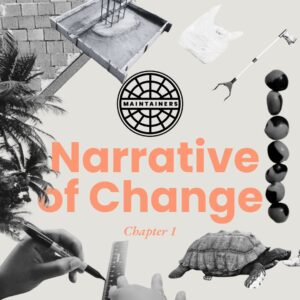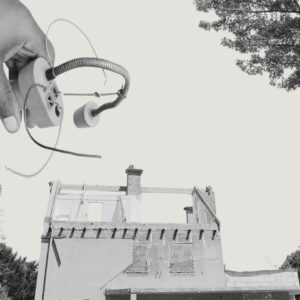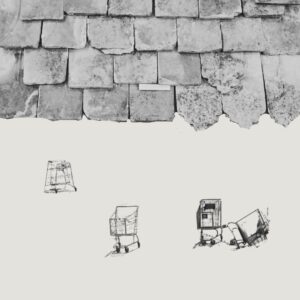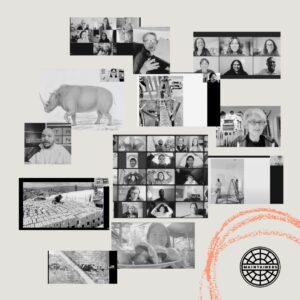Narrative of Change: Chapter 1

Summary: The Maintainers network has transformed from an in-person conference series to a virtual space, convening practitioners and academics. This Narrative of Change blog post will be the first of two chapters. In this iteration, we articulate how our network has evolved since its inception, and how we envision our future as we stay committed to supporting a well-maintained and more cared-for world.
Dear Maintainers Community,
Defining what maintenance means is often complex. Maintenance encompasses more than just repairing objects or keeping equipment in working order. It embodies elements of care, addressing economic and social inequities, fostering digital infrastructure for impact, and ensuring healthy living environments for our communities. At its core, The Maintainers strives to support a society that values maintenance, repair, and care by celebrating its cross-cultural implementation and infrastructure.
As we approach the end of our grant-funded period in December 2024, this Narrative of Change provides an overview of our journey and extends an invitation for further dialogue. We witness the global momentum for maintenance thinking and action, and are inspired by the creativity and collaborative spirit evident in the efforts you all champion.

Where we have been: gathering interest
Many of our long-standing community members remember the origination of The Maintainers as a conference co-founded by Andy Russell and Lee Vinsel after an enthusiastic response to the piece Hail The Maintainers published in Aeon. The first and second Maintainers Conferences in 2016 and 2017 were hosted at Stevens Institute of Technology in Hoboken, New Jersey. The third was held in 2019 at Gallaudet University in Washington, DC. They were attended by humanities researchers, archivists, artists, and engineers – largely academics based in the United States – to discuss the growing tension between more sustainable development models and a model led by repeated breakthrough innovations steered by capitalism.
In 2018 Jessica Meyerson joined the leadership team and focused on comparative methods to surface key similarities and differences across “maintenance spheres”. The Maintainers convened two groups (later called Maintenance Communities) focusing on the spheres of “work” and “information”. After meeting in-person at the 2019 conference, The Maintainers published Information Maintenance: A Practice of Care. The Information Maintainers continued to meet under the facilitation of Devon Olson and Jordan Hale. Not surprisingly, the COVID-19 pandemic motivated a shift in how The Maintainers addressed actionable impact.
With support from the Alfred P. Sloan Foundation and the Siegel Family Endowment, we expanded the team by onboarding Lauren Dapena Fraiz in 2020 and Liliana Coelho in 2022. Working closely with advisory committee members of the time (Camille Acey, Guru Madhavan, Bethany Nowviskie, and Nathan Proctor), we sharpened our focus to center community-based practitioners and the impact they were creating within our programs. This has led to a deliberate emphasis on engaging community leaders alongside academics who are deeply involved in or affected by, maintenance, repair, and care actions in their locales.
Building a maintenance movement: better together
One of our most robust programs has been the design of the Maintainers Movement Fellowship, broadening our understanding of the cultural and geopolitical nuances impacting communities when maintenance is overlooked. This fellowship program cultivates interdisciplinary learning spaces and does the work to foster connections among practitioners and academics.
Our Fellows lead on-the-ground practices, are educators, and/or public communicators that inform our topical priorities. They cover topics such as repair collectives (e.g. repair cafes, fixer groups, mending education), sustainable built environments, food sovereignty, regenerative farming, just energy transition policies, circular economies, degrowth principles and labor solidarity movements for maintenance workers among others. Maintainers Movement Fellows contribute a range of outputs to our expanding body of work including landscape scan reports, virtual events and workshops, photographic essays and blog posts, interviews, and media like podcast, virtual galleries and audio interviews.
Our past Fellows include Maximillian Alvarez, Leila Behjat, Sam Bennett, Rheanna Chen, Himadri Das, Sarah Sao Mai Habib, Terra Graziani, Jennah Jones, Himani Kulkarni, Mathew Lubari, Linda McIntyre, Tonatiuh Rodriguz-Nikl, and Purna Sarkar. We continue an active past alumnae cohort of Movement Builders that support capacity building and strategy within The Maintainers network. These efforts include directive input around partnership priorities, translational research efforts, targeted outreach, and serve as ambassadors for The Maintainers network.
Breaking silos to foster skill-share among practitioners has become integral to our model. By placing practitioners in connection with one another through the Fellowship, we cultivate a space of mutual understanding and maintenance appreciation. As Leila Behjat (2022 Fellow and 2024 Movement Builder) expresses, “The Maintainers Fellowship sensitized me to the precious role of care and maintenance in the built environment and increased my awe and respect for those committed to it today. The question and observation ‘who cares!?’ has become a requisite in all aspects of my work.”
Our transition from solely focusing on academic conferences to actively supporting community-based leaders in collaboration with one another reflects an enduring commitment to our interdisciplinary approach and value of knowledge exchange. We also bridge the gap between academia and practical application by relationship cultivation through one-on-one information sessions, network-wide Maintainers Meet Ups, and through targeted educational communication campaigns to celebrate maintenance initiatives happening worldwide.

Where we are: bridging global maintenance initiatives
While we bring together practitioners situated in different professional spheres, we also seek to connect across geographies. We believe that international cooperation and knowledge sharing is fundamental in advancing society as a whole. In the words of Himadri Das (2021 Fellow and 2024 Movement Builder) of Repair Cafe Bangalore, “Engaging with the Maintainers in 2021 has expanded my perspective of repair and maintenance in the context of developed and developing economies. Whereas repair is seen as a sustainability initiative in developed economies, it is essentially a means of livelihood in developing economies such as India.”. Mathew Lubari (2023 Fellow and 2024 Movement Builder) has pointed out in his work that, “While repair and maintenance is relevant from the perspective of circular economy in developed societies, in the case of displacement settings or underdeveloped societies it is a form of survival or at least a means of ensuring the status quo.” While our operations and funding are currently US-based, this sentiment has been raised by community members outside of the US, pointing to the importance and value of global connection and leadership distribution.
Our goal is to ensure that individuals traditionally excluded from decision-making have a strong voice within The Maintainers network. To honor and amplify these practices, we’ve implemented various initiatives such as compensated Fellowships and speaker series to highlight global maintainers. These collaborations span economic and social contexts, and point us toward centering critical issues such as protecting infrastructures in our climate crisis, redefining land ownership as stewardship, improving waste management practices, and promoting the teaching and learning of repair skills to people of all ages and abilities. By fostering a more geographically diverse network and bridging international practitioners – particularly those from the Global South and those historically marginalized in the Global North – we can better address maintenance, repair and care challenges and implications in our own communities.

We are what we maintain: sustaining together
What we love most about The Maintainers is the eclectic pull that draws our community together. We feel your shared passion for maintenance, repair, and care work. We’re always keen to learn when The Maintainers has impacted your work, or inspired your community (drop us a line to let us know!).
Educators across grade levels including college students, high-schoolers, and adult learning spaces have incorporated ideas from The Maintainers to build a curriculum around maintenance studies. Similarly, scholars and theorists in maintenance, repair, infrastructure, and care fields have found a rich network through The Maintainers’ listserv and convenings, helping them advance their ideas alongside colleagues worldwide. This growing interest is mirrored in the increased focus of funders and public interest institutions on topics like maintenance, repair, and infrastructure, exemplified by initiatives such as the Build Back Better Plan. While there is still a lot necessary to change our existing systems, we believe that a shift in policy discourse combined with collective action will point the way to a new culture and societal disposition around the value of maintenance.
As Linda McIntyre (2021 Fellow and 2024 Movement Builder) who studied the maintenance of coastal communities affected by fluctuating water levels shares, “the theme of maintenance feels very timely and important as we try to move beyond a culture of convenience and disposability.” Our network believes the momentum behind maintenance thinking and action is growing. Creating a culture of maintenance is a mindset for the years to come, and cultivating it requires patience, hope, and long-term thinking.
We are proud of our community and the impact the network has in building a new global culture around maintenance. According to Purna Sarkar (2021 Fellow and 2024 Movement Builder), “Being part of The Maintainers community has provided us with a sense of connection to the global community of maintainers and repairers.” Grassroots practitioners have played a crucial role in this movement, and we are optimistic about a future where the maintenance mindset is widespread. We know there is a world in which we create better consumption and production models, enhance our individual and collective ability to repair and care, celebrate maintenance labor and its worth, and strengthen relationships across the globe for impactful maintenance policies and community-based initiatives.
We are grateful to participate in this global movement and hope you share the sentiment in this organizational relevance to amplify and sustain The Maintainers’ lasting impacts.

Coming Up
In our Chapter 2 of The Maintainers’ Narrative of Change we’ll share about paths forward, maintaining The Maintainers, and launch our call for support.
We currently have grant funds to sustain our operations until December 2024, but lack resourcing thereafter. This summer, we will be sharing a call for support, outlining the programs we seek to fund, and the necessary funding to continue our work in 2025 and beyond. More details on this campaign will be published soon. In the interim, please reach out if you would like to support us in this resourcing strategy and capacity building.
We approach this pivotal moment with utmost senserity, recognizing the significant role our work plays in supporting maintenance, repair, and care-oriented practitioners and projects, alongside the body of work that has been produced through The Maintainers. However, it’s important to also convey that without securing operational funds by the end of September 2024 – we will need to consider a shift in focus towards organizational sunsetting and asset distribution, rather than program implementation.
We welcome your guidance, support, and camaraderie as we navigate this critical period, and thank you for your continued involvement and support in this moment in The Maintainers’ history.